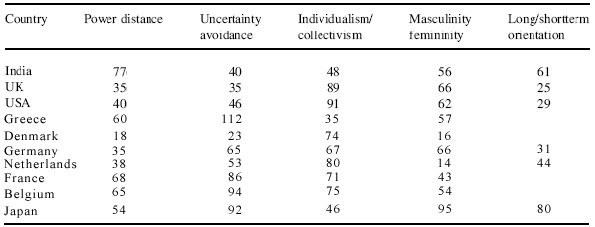Cultural peculiarites and perspectives
These notes form a part of sanjeev shankar's research, which is summarised in his research report
An understanding of cultural peculiarities and metaphors can facilitate a deeper understanding to create localised solutions and create strategies to motivate people. From 1970 onwards, Prof. Geert Hofstede has analysed cultural values and proposed five parameters, which have a significant impact on behaviour in all cultures.1) Even though using numbers as cultural indicators is not the best method, the researcher would like to share these observations and hopes that this can result in a practical systemic solution. Further, India has undergone rapid change over the last five years and continues be a complex, evolving culture.
Individualism versus collectivism refers to the relationship between individuals and groups. Individualistic cultures consider individuals as core of the social structure and expect individuals to look after themselves. Collective cultures stress the importance of groups and expect members of a group to support each other. India is almost two times more collectively oriented than US and UK. It is a collective culture, where group affiliations take precedence over individual goals, and members of a group strongly support each other. Word of mouth and encouragement from family and friends are major drivers to decision making. Social support is actively sought. This is evident in other places like Cuba, Nepal, Greece, Japan, Guatemala, Mexico, Philippines and China, where concept of sharing and co-ownership of assets is common.
Power distance is the extent to which the weaker members of a society accept inequality in power. Despite the caste system being forbidden and the government operating a positive discrimination policy towards the 'lower' classes, India is characterised by a well-defined social framework that clearly differentiates people according to their social class. Relationships between classes are regulated by strict unwritten rules. Upper and lower class people live parallel lives with minimum overlap. India has a high power distance as compared to US and Europe and this has resulted in the failure of numerous public policies. Illiteracy and poverty are major contributory factors for this.
Uncertainty avoidance is the extent to which a society feels uncomfortable with unknown situations, ambiguity and uncertainty. The statistics reflect a high resistance to change in Greece, Japan, France and Belgium.
Masculinity versus femininity refers to the distribution of emotional roles between genders. Masculinity stands for a society where gender roles are clearly distinct (e.g. notions that 'men are competitive and tough'; 'women are caring and social'). Femininity stands for a society where social gender roles overlap. India, especially rural India has a high masculinity versus femininity ratio.
Long-term versus short-term orientation refers to the extent to which members of a culture are willing to accept delayed gratification of material, social and emotional needs. Long-term orientation encourages virtues oriented towards future rewards. Short-term orientation promotes virtues related to rewards at the present time. Thrift, perseverance and patience are major virtues in long term orientation societies. These qualities affect the way people are willing to change well established behavioural patterns and affect people’s perception of time and waiting. India and Japan show long-term orientation whereas, US and UK are short-term oriented.
Another crucial aspect is of Communication. India is hampered by illiteracy and language variety. Some 35% of the population is illiterate and the percentage rises to 46% among the women. Hindi is the principal official language but the Indian Constitution recognises another 17 official languages. This is a crucial statistic since words and their associative meanings play a crucial role in the Indian context. 'Pesticides' in many parts of India still translate to 'medicine' in the local language! As such it is suggested by the researcher that in India it is more important to 'go back to the roots' while imbibing modern aspects of permaculture.
